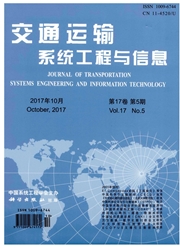

 中文摘要:
中文摘要:
为了实现对道路交通抗拥堵能力的识别和定位,为解决城市交通拥堵问题提供参考,本文从城市道路交通抗拥堵能力的影响因素入手,借助大规模样本数据,采用探索性因子分析法,借助SPSS软件构建了城市道路交通抗拥堵能力的三层指标体系,提出了抵抗交通拥堵的4种能力和8项指标;利用vague集的模糊评判思想和层次熵分析法,建立了城市道路交通抗拥堵能力的模糊评价模型.结果表明,交通社会化理念作为本文提出的一项新的、宏观的指标,在抗拥堵能力评估中开始发挥较大作用;实例分析的结果说明了青岛市内七区抗拥堵能力不高的现状,同时验证了vague模糊评判结果的合理性.
 英文摘要:
英文摘要:
This paper identifies and categorizes the causes of traffic congestion through the factor analysis method and SPSS. It is beneficial for locating the ability of congestion resistance of road traffic, and providing a reference to solve the problem of urban traffic congestion. With the large-scale sample data, the study starts from analyzing influencing factors of the anti-congestion ability, The index system consisting of 3-level indicators is teased, which also includes four kinds of capacity and eight indicators of resistance to traffic congestion. Then, using vague set of fuzzy judge ideology and hierarchy entropy analysis method, the paper formulates the fuzzy evaluation model of urban road traffic capacity of anti-congestion. The results show that as the new macro indicators, the traffic socialization concept plays an increasingly important role in assessing the anti-congestion ability. The causes of the poor status of the anti-congestion ability are alsoanalyzed for seven districts in Qingdao, China, and the feasibility of the vague fuzzy evaluation results are also illustrated.
 同期刊论文项目
同期刊论文项目
 同项目期刊论文
同项目期刊论文
 期刊信息
期刊信息
